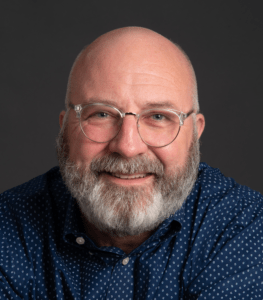There’s a common thread to much of the social conflict we’re seeing in church and society these days, and it has to do with our willingness to edit our own stories. Let’s call it a hardening of the narratives.
One big story from the coronavirus pandemic stands out as an illustration. Have you heard anyone complain about what seemed like a changing story line on the efficacy of mask wearing? Yeah, this remains a big complaint especially among the deniers.
Here’s a summary of the critique: “First, you told us we didn’t need to wear masks, then you said we did. How can we trust you to tell us the truth?” Sound familiar?

Mark Wingfield
This also is the reason a certain segment of the population loves to hate Anthony Fauci and is now calling for his head after seeing archived emails that span the course of the pandemic, showing how even he changed his mind about masks as the evidence mounted. His cardinal sin appears to be that he changed his mind. God forbid.
What we witnessed over the months of the worst pandemic of modern history — something we had no track record to understand — was that science had to keep adapting as we learned more about the virus. At first, we reasonably thought it was transmitted on surfaces and not through the air. But with more time and evidence, we learned it was indeed transmitted through the air more than on surfaces; thus, masks were highly effective in stopping transmission.
The first story about masks was not an intentional lie; it was based on the best information available at the time. But as so often happens, we gained additional information and had to reconsider what was true. That’s not a sin. It is, instead, a salvation.
We see the same root hardening of a narrative at work in protestations over how we teach race and slavery in American history. Although the term “Critical Race Theory” has become the catch-all boogeyman for these concerns, the actual issue is a fear by white folks that they and their children are going to be made to feel guilty about the systemic racism built into our culture since slavery. They just don’t want to hear it.
“Truth be told, we can be proud of our country without having to believe we are God’s last great white hope for the world.”
Hearing this new story, this more accurate story, edits the narrative of our white lives. It requires us to reconsider the heroes of our national history as more complicated characters than we were originally taught. More painfully, it requires us to reconsider the myth of American exceptionalism that has been conflated with national pride for far too long. Truth be told, we can be proud of our country without having to believe we are God’s last great white hope for the world.
The story of our national history we were taught in school is incomplete at best. We can’t change that, but we can correct the story. We can edit the narrative to tell the fuller truth that is available to us. Again, no crime in that.
Yet, you would think such a reframing centered on truth is shaking the pillars of the earth itself, to hear the wailing.
This is nuts. Imagine a different scenario: You’ve been told from a young age that you carry a genetic marker that destines you to a fatal illness. But somewhere along in your 30s, new testing becomes available that clarifies your genetic makeup and you are told you will not, in fact, die from this inevitable illness. Would you decline the new information and demand to stick to the earlier, fatal diagnosis? Of course not.
Science (of which medicine is a part) is a study of things that we continually learn more about. And so is history. And so is theology.
I’m remined of the church member who came to me during our church’s intensive study on LGBTQ inclusion and said: “If I believe that what my parents and grandparents taught me about this was wrong, how will I know everything else they taught me isn’t wrong too?”
First, I suspect he was giving his parents and grandparents too much credit for having taught him anything at all about sexuality. And second, this illustrates the danger of living an unexamined life. When the very thought of reconsidering an issue based on new information threatens the whole of your identity, you’re living on shaky ground.
This inability or unwillingness to edit our stories as new evidence becomes available lies at the root of our national conflicts today.
A disclaimer: I can’t claim credit for this brilliant insight myself; in fact, I’ve struggled for some time to make sense of it all. Credit goes to Nesrine Malik, a columnist and features writer for The Guardian and author of “We Need New Stories: The Myths that Subvert Freedom.” She makes a compelling case for the benefits of editing our personal, cultural and national stories.
This is the exact challenge that will confront messengers to the Southern Baptist Convention annual meeting this week. They are being asked on several fronts to edit the narratives they’ve been told — and such editing faces loads of fearful opposition.
“We can prevent future generations from feeling the need to apologize for our sins today.”
Edits are needed to the story of male dominance, racial equality, care for sexual abuse victims, trust in denominational leaders and even the lie of how the SBC was saved from liberalism and decline by the Pressler-Patterson coalition of the 1980s. Yet there is resistance to telling these stories more truthfully because the truth is hard and because too many in the SBC still believe the lies that created the erroneous narratives in the first place.
Remember that it only took the SBC 150 years to acknowledge it was founded in racism over the issue of whether a slaveholder could be appointed as a foreign missionary. Finally editing that story did not produce immediate or significant change, however, because the system was so built around the earlier narrative.
Do not be distracted by those who cry that it is unfair for them to be expected to apologize for the sins of their ancestors whom they didn’t even know. We cannot change what has happened, and we cannot sufficiently apologize for what others have done.
What we can do, though, is acknowledge the injustices that have happened and amend our current course in light of that information. We can prevent future generations from feeling the need to apologize for our sins today.
“Wokeness” — which seems to be a dirty word in the SBC — is not about turning back time. It is, instead, about redeeming our time, awakening to our present reality and changing the story toward a better ending while we can.
Our generation’s story is unfinished. Whatever foreshadowing or plot lines have preceded us, we have the ability to turn them to good rather than being predestined to perpetuate the sins of our fathers and mothers. That editing begins with knowledge, not denial.
Mark Wingfield serves as executive director and publisher of Baptist News Global.
Related articles:
There’s controversy again, and more people are attending the SBC annual meeting
When did ‘woke’ become a four-letter word? | Opinion by Greg Garrett
‘Southern pride’ or racism? White Christians are compelled to discern the difference. And confess. | Opinion by Alan Bean


